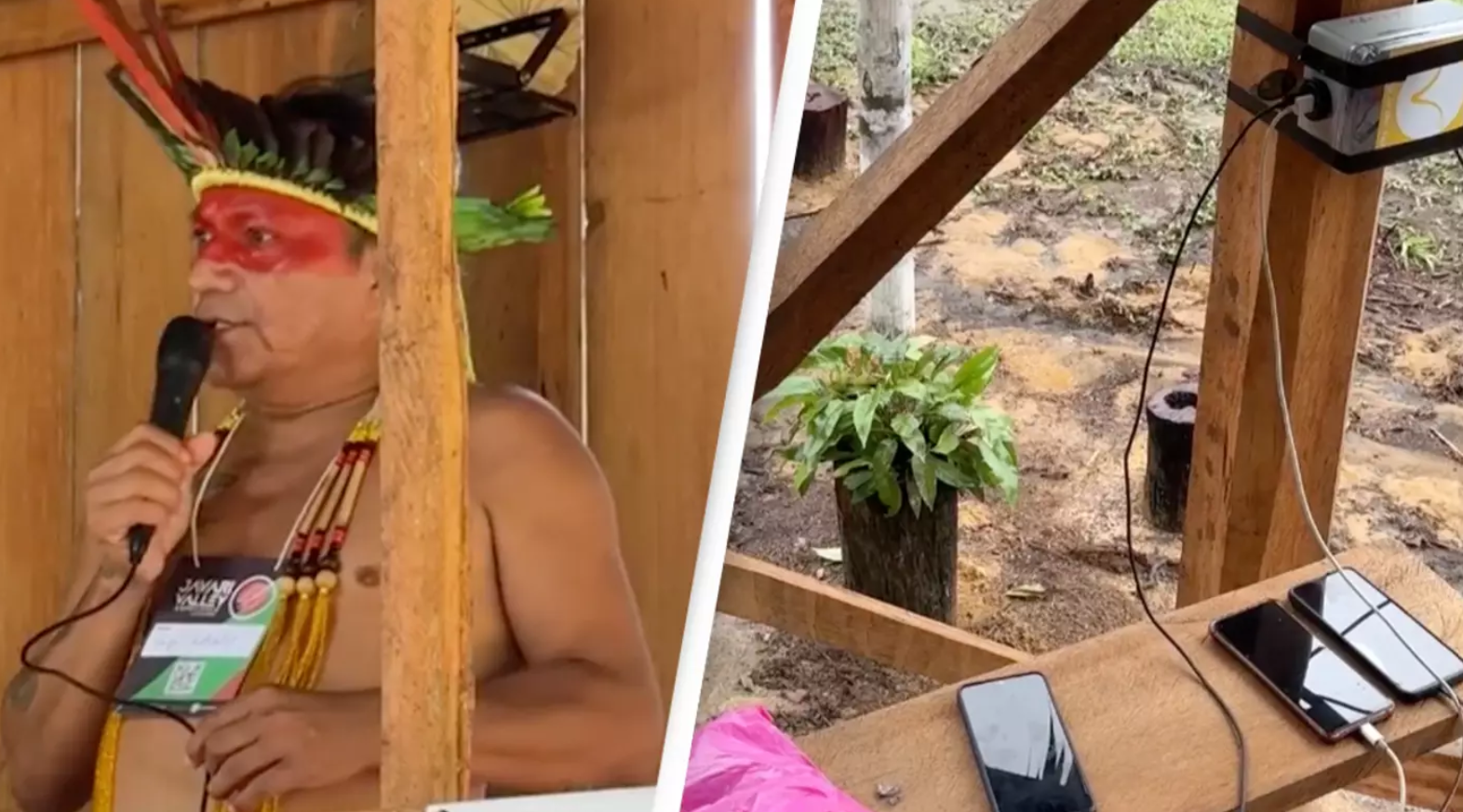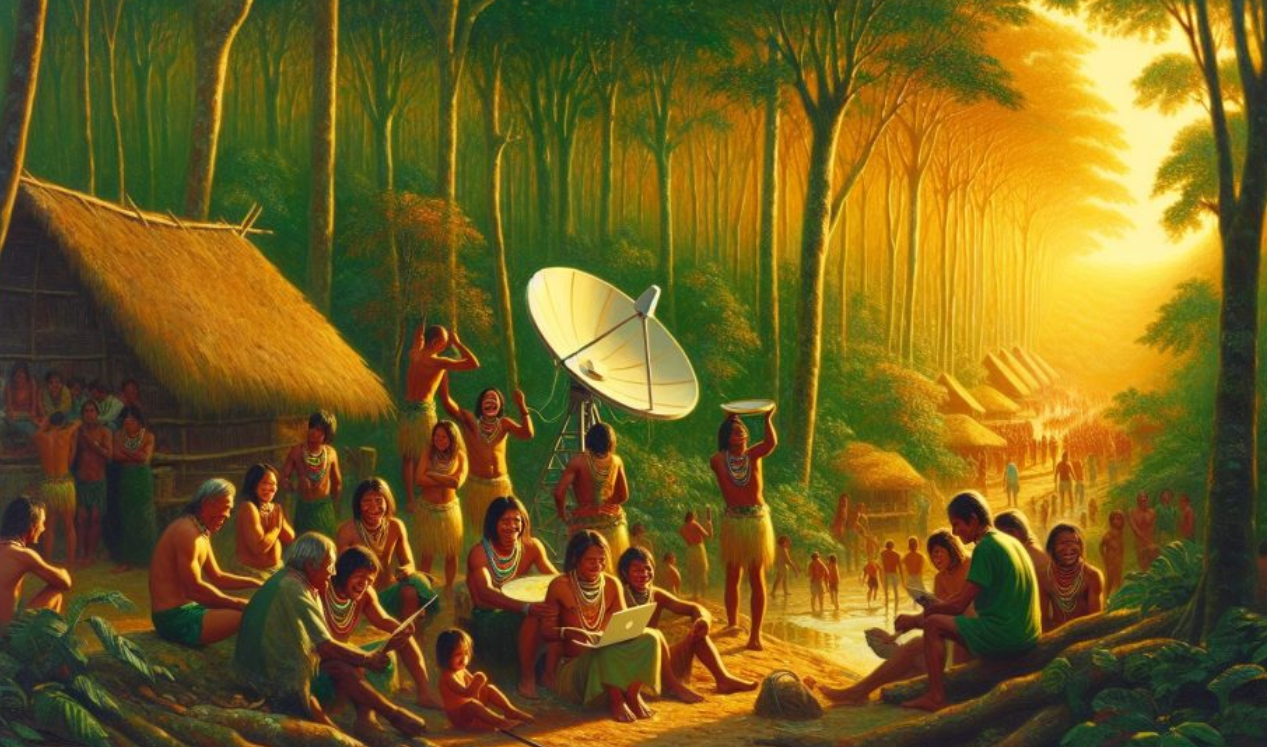The remote Amazon tribe, which has always been insulated from the advances of modern technology, recently experienced a radical shift in their way of life after gaining access to the Internet. This tribe, previously living in harmony with nature, away from the trappings of the digital world, was introduced to the cornucopia of information and entertainment available online. However, among the vast array of options, two aspects seemed to have captured their attention the most: adult content and social media.
In an astonishingly short period, the tribe developed a penchant for these two forms of digital engagement. Their fascination with adult content was especially surprising considering their traditional lifestyle and societal norms that have remained unchanged for centuries. This shift in their interests suggests a universal human curiosity, regardless of cultural or societal backgrounds. The tribe’s rapid immersion into the world of adult content provides a stark example of how exposure to the Internet can precipitate unexpected changes in the behavior and interests of isolated communities.
The tribe’s fascination with social media is equally intriguing. The concept of virtual interaction, so far removed from their previously face-to-face communication, has become a captivating part of their daily routine. Platforms such as Facebook, Twitter, and Instagram have become instant hits. The tribe has enthusiastically embraced the opportunity to connect with the wider world and experience a form of communication that was previously unimaginable to them.
Despite the allure and enthralling novelty of these digital platforms, their sudden introduction has raised concerns. The once peaceful and content tribe now spends a significant amount of their day glued to screens, leading to a drastic change in their lifestyle. The age-old practices and traditions that were once the backbone of their community are now being overshadowed by the allure of the digital world.
Furthermore, the tribe’s newfound interest in adult content and social media has led to a shift in their societal norms and cultural dynamics. With their exposure to these new forms of entertainment and communication, the tribe is beginning to grapple with concepts that were previously foreign to them, such as privacy, consent, and digital etiquette.
This sudden change also raises questions about the potential impact on the tribe’s mental health. The addictive nature of adult content and social media, well-documented in more technologically advanced societies, is a matter of concern. The tribe’s abrupt immersion into the digital world, without the necessary understanding of its potential pitfalls, could lead to harmful consequences.
In conclusion, the remote Amazon tribe’s sudden exposure to the Internet, and their subsequent fascination with adult content and social media, is a complex issue. It highlights the universal human curiosity and the transformative power of the Internet. However, it also underscores the potential risks and challenges that come with the rapid introduction of technology into previously isolated communities. As the world becomes more interconnected, it is crucial to consider these issues and work towards ensuring that such transitions are handled responsibly and ethically.

“The Internet Has Become Essential to Our Lives”
The internet has undeniably emerged as a crucial aspect of our contemporary lifestyles. It has drastically transformed how we communicate, learn, work, and entertain ourselves. It’s a vast digital universe that provides us with a wealth of information at our fingertips, enabling us to become more informed and connected than ever before. From chatting with friends on social media platforms to conducting online research for a school project, it’s difficult to imagine a day without the internet.
Moreover, the internet has revolutionized business operations. Today, companies use the internet for various activities, including marketing, customer service, and sale transactions. In fact, e-commerce has become a dominant economic force, reflecting the critical role of the internet in today’s society.
Similarly, educational institutions have integrated the internet into their systems. It has become an essential learning tool that enhances the educational experience by providing students with access to online resources and platforms for virtual learning. The internet has also made distance learning possible, allowing individuals to pursue education from any location worldwide.
In terms of entertainment, the internet has substantially changed our consumption habits. It has provided us with a multitude of entertainment options, including online games, streaming services, and social media platforms, which have become popular leisure activities.
The internet has also become a significant tool in maintaining social connections. In an era where physical distances often separate families and friends, it has created a platform where we can stay connected with our loved ones through various social networking sites and communication apps.
Indeed, the internet’s influence is pervasive and undeniable. It has become an integral part of our lives, shaping our daily experiences and interactions. As such, it is essential to recognize the importance of the internet in our society and explore ways of maximizing its potential for our benefit.

Connectivity: From Zero to Five Bars
The evolution of connectivity, from zero to five bars, has been an instrumental part of our technological advancement. In the early days, mobile phones were merely a luxury and connectivity was often unreliable at best. We’d clamber up hills, climb rooftops, or hang out windows in a desperate bid to latch onto that elusive single bar of signal. Those were the days of zero bars, where missed calls and undelivered messages were the norm.
The advent of the digital age ushered in an era of heightened connectivity. From one bar, we moved to two, then three, and so on. Each additional bar symbolized an increase in signal strength, improved call quality, faster data transfer, and a more seamless mobile experience. However, the journey to achieving five bars wasn’t an overnight success. It involved years of research, technological enhancements, and infrastructure development.
The introduction of 3G, 4 good bars of connectivity, was a major breakthrough. It enabled quicker internet browsing, video calling, and a host of other features that were previously unimaginable. Then came 4G, the fourth bar, which took connectivity to a whole new level. Suddenly, streaming videos, downloading music, and playing online games on your mobile device became a breeze.
Now, we stand on the brink of the 5G era, the fifth bar in our connectivity journey. With promises of unparalleled speed, reduced latency, and the capacity to connect a multitude of devices simultaneously, 5G is set to revolutionize the way we interact with technology. Yet, it’s not just about the bars on our phones. It’s about the societal transformation this connectivity enables – the way it allows us to stay connected to people, places, and opportunities.
From zero to five bars, the story of connectivity is one of progress and possibility. It’s a testament to human ingenuity and our relentless pursuit of better, faster, and more reliable ways to communicate. As we look forward to the future, one can only wonder what the next bar of connectivity will bring.

Cultural Shifts and Digital Influence
The world has witnessed significant cultural shifts over the past few years, largely due to the influence of digital technology. It has profoundly altered how we communicate, learn, work, and even entertain ourselves. The rise of social media platforms like Facebook, Twitter, Instagram, and YouTube, for instance, has revolutionized the way we share and consume information. Individuals and communities across the globe can now interact with each other in real time, breaking down geographical barriers and fostering a global culture of connectivity and sharing.
However, this digital influence hasn’t been without its challenges. The spread of misinformation, cyberbullying, and the potential for digital addiction are all byproducts of this new culture. Moreover, it has also led to a shift in power dynamics, with technology companies holding a substantial amount of control over information and personal data. The cultural landscape is now shaped by algorithms and data feeds, which can manipulate public opinion and even influence political outcomes. Therefore, it’s crucial to foster a digital culture that promotes transparency, accountability, and ethical standards. This will ensure that digital technology continues to enrich our lives and society, rather than creating division and mistrust. The digital influence on cultural shifts is a complex issue that requires ongoing dialogue and critical examination as we navigate the ever-evolving digital world.
Navigating the Digital Landscape: Challenges and Impacts
Navigating the digital landscape comes with significant challenges and impacts, fundamentally altering the way individuals and organizations operate. One of the primary challenges is the heightened vulnerability to cyber threats. As technology advances, so does the sophistication of cyber-attacks, leading to potential breaches of sensitive information and consequent reputational damage. This challenge necessitates robust cybersecurity measures to ensure the integrity and confidentiality of digital platforms. Another challenge is the digital divide, which refers to the gap between those with access to technology and those without. This disparity widens socioeconomic inequalities and hinders global development efforts.
On another note, the digital landscape’s impacts are profound. One significant impact is the democratization of information. The digital landscape allows for the widespread dissemination of knowledge, breaking down geographical and socioeconomic barriers. Moreover, it has revolutionized communication, facilitating real-time interaction irrespective of physical distances. This has fostered global connections and collaborations, leading to advancements in various sectors.
However, the digital landscape also has its drawbacks. It has contributed to information overload, a phenomenon where individuals are bombarded with more information than they can process. This can lead to confusion, stress, and ultimately, decision paralysis. Furthermore, the digital landscape has given rise to issues of privacy invasion and data exploitation, with personal information being collected, used, and shared without explicit consent.
In conclusion, while navigating the digital landscape presents numerous challenges, it also brings about significant impacts, both positive and negative. Therefore, it is crucial to strike a balance between leveraging the benefits of this landscape and mitigating its potential pitfalls. As the digital landscape continues to evolve, it’s equally important to adapt and develop strategies to navigate it effectively.
